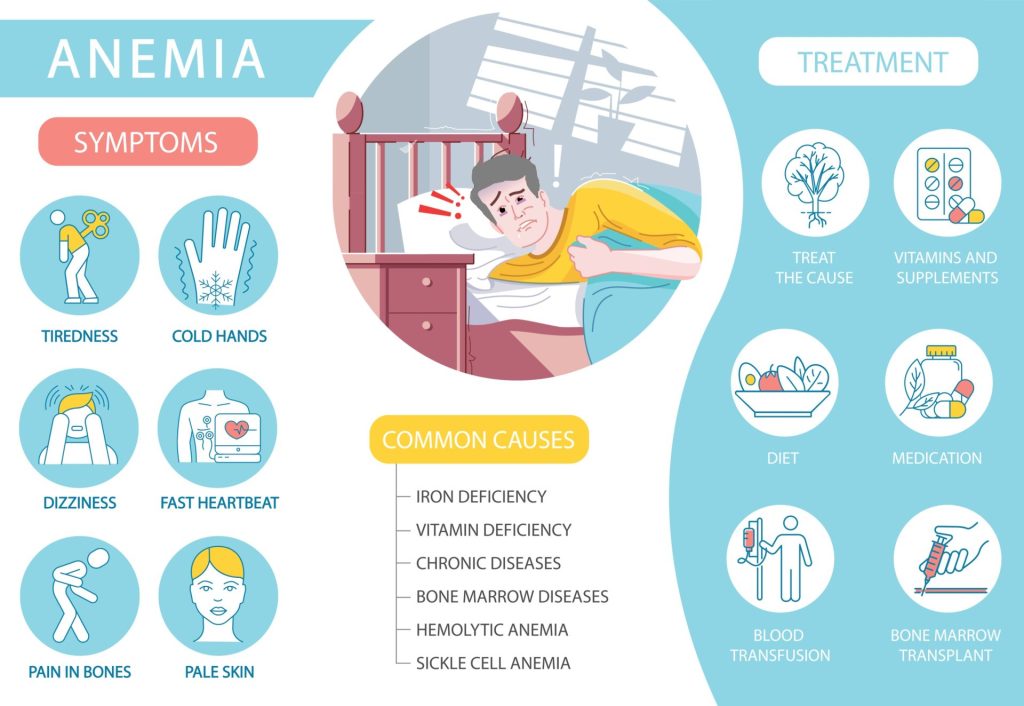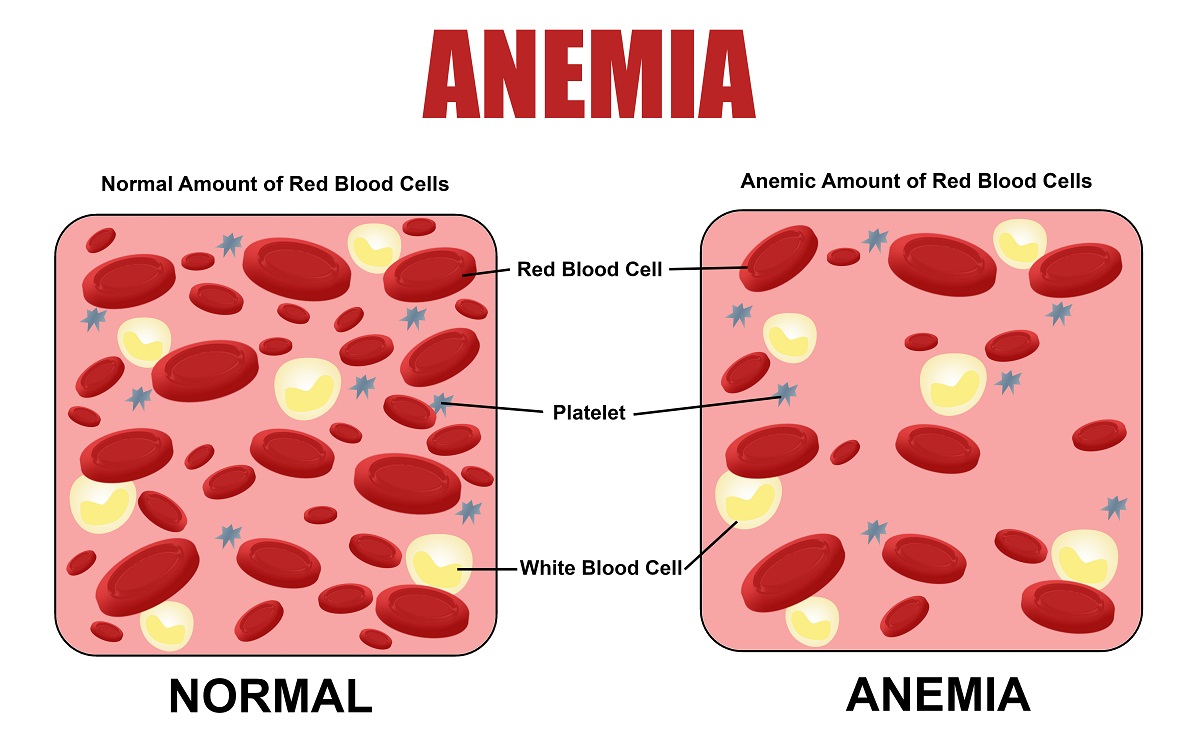Recent studies have shown that low blood count or anemia is associated with increased risks of the mild cognitive impairment (MCI) that may precede Alzheimer’s disease. Many times of anemia are treatable so the memory loss that accompanies it may be as well. It may be the culprit in many cases of MCI.
Anemia affects 1 in 10 older adults in the United States. Research shows that being anemic can be a risk factor for incident dementia, a group of brain disorders that impair one’s cognitive function. If your loved one experiences a cognitive decline, such as memory lapses, due to having a low blood count, know that proper treatment can reverse symptoms like that.
What Is Anemia And What Causes It?
Anemia is a condition that arises when the body has a low number of healthy red blood cells.
These cells contain hemoglobin, a protein responsible for carrying and distributing oxygen throughout the body. In men, the normal hemoglobin level is 14 to 17gm/dL and 12 to 15gm/dL for women.

There are different types of anemia, categorized depending on what causes the condition:
- Iron Deficiency Anemia. Being anemic is commonly caused by an iron shortage in the body. Iron is a mineral the bone marrow needs to produce hemoglobin for red blood cells. In adults, having an iron-poor diet can increase the incidence of age-related anemia.
- Anemia Associated With Chronic Diseases. Apart from iron deficiency anemia, this type is the most common among geriatric patients. It occurs due to an existing chronic disease (e.g., cancer, kidney, or heart disease).
- Vitamin Deficiency Anemia. Folic acids and vitamin B12 are essential in red blood cell production. A lack of these nutrients can drive the red blood cell count down.
- Aplastic Anemia. This rare anemia happens when the body stops producing red blood cells. Considered life-threatening, it can be caused by certain medications, infections, and exposure to a toxin. Autoimmune diseases can also lead to aplastic anemia.
- Hemolytic Anemia. It occurs when the body destroys red blood cells at a rate faster than the bone marrow produces the cells’ replacement. This anemia can be hereditary or caused by a blood type mismatch during transfusion.
- Sickle Cell Anemia. This inherited anemia causes the round red blood cells’ shape to change into sickle-like. The transformed cells are stiff and sticky and can affect blood flow.
Other possible causes of anemia include pregnancy, slow blood loss (e.g., heavy menstruation), sudden blood loss, and thyroid problems.
How Can You Tell If You Have Anemia?
People with low hemoglobin levels usually show the following signs:
- Unusual weakness
- Unhealthy, pale skin complexion
- Dizziness, lightheadedness, and frequent headaches
- Low blood pressure
- Dry and damaged hair and skin
- Difficulty sleeping
Different types of anemia also bring forth other symptoms.
For instance, anemia due to iron deficiency can cause pica (hunger for strange things like ice or paper) and koilonychia (upward curvature of nails) and increase cholesterol levels.
If the anemia is caused by Vitamin B 12 deficiency, it can also cause a loss of sense of touch, difficulty walking, and dementia.
How Does Anemia Make You Feel?
Suspecting that you have anemia? This condition can make you feel or experience the following:

Fatigue
When there’s a lack of oxygen in the body, you will feel less energetic. Your body will need to work hard to accomplish even simple tasks. This can also lead to irritability and poor concentration.
Shortness Of Breath And Heart Palpitations
You may experience shortness of breath after doing some physical activity — including walking and stair-climbing. You may also find your heart beating abnormally fast.
Restless Legs
This syndrome refers to a strange, strong urge to move your legs when at rest.
Soreness In Tongue Or Mouth
This is a common symptom of anemia caused by a lack of iron. You will experience dryness or a burning sensation in your mouth or tongue. You will also find painful, red cracks in your mouth’s corners.

Cold Hands And Feet
This can be traced to the lack of oxygen in the hands and feet. Anemic people also tend to be more sensitive to coldness in general.
Does Anemia Cause Memory Loss?
Research shows that anemia is associated with mild cognitive impairment (MCI), which increases the risk of dementia. According to the National Institutes of Health, about 10% to 20% of older adults with MCI develop some form of dementia — including Alzheimer’s disease — within a year.
In the elderly, cognitive decline is a common sign of anemia.
Neurology experts claim that low hemoglobin levels can cause hypoxia (low oxygen levels) in brain cells, beta-amyloid precipitation, and neuron inflammation. All this can, in turn, lead to brain issues like forgetfulness and memory loss.
Abnormal hemoglobin levels can also cause white matter lesions and lower connectivity among different brain parts. As a person ages, incorrect hemoglobin levels can increase the risk of dementia.
The lack of iron itself can affect cognitive function. Iron deficiency can affect various cellular processes (including neurotransmitter synthesis and mitochondrial dysfunction), impacting how the brain functions.

What Symptoms Can Memory Loss Anemia Produce?
Anemia can further present the following symptoms.
Affects Brain Function
Progressive brain cell degeneration and death can impact parts of the brain responsible for executive functions such as planning, flexible thinking, and juggling multiple tasks. When anemia affects the brain, it can make one feel challenged to accomplish routine activities.
Causes Brain Fog
Iron deficiency can cause brain fog — a symptom where an individual lacks mental clarity. It can make you forget what you’re doing moments later or lose your train of thought. It can also affect how you follow conversations and your ability to recall recently heard words.
Causes Confusion
Confusion is common among patients affected by dementia, like Alzheimer’s. Anemic people can also display this symptom. Confusion refers to feelings of disorientation and one’s inability to clearly and quickly think. It can cause them to lack awareness of time or location, or slur or have long pauses when speaking.


What Is The Treatment For Anemia?
To properly identify anemia, healthcare providers perform blood tests like a complete blood count (CBC) to count blood cells and determine the size and shape of your red blood cells. They may do additional diagnostic tests to determine the underlying cause behind the condition.
Depending on the type, cause, and extent of anemia, doctors will provide different treatment plans.
Typically, mild anemia can be addressed with appropriate dietary changes and supplements. For example, if you lack iron, you will be prescribed to take iron supplements and encouraged to consume more foods rich in this mineral (e.g., dark and green leafy vegetables like spinach).
Sometimes, patients may be treated with certain medicines to address the root cause of anemia. You will be given hormone-controlling pills if it’s caused by heavy menstrual bleeding.
Other procedures include blood transfusion, blood, marrow stem cell transplant, and surgery.
Does The Memory Loss Go Away With the Treatment Of Amenia?
Memory loss associated with anemia can be reversed once the cause of low hemoglobin levels is addressed.
In general, anemia treatment plans aim to raise your hemoglobin and red blood cell count to normal levels, subsequently supplying your body — including your brain — with adequate amounts of oxygen. Restoring a constant supply of oxygen (together with other nutrients) to the brain will help it function properly again.
Proper intervention can effectively manage and reverse cognitive impairments and reduce an anemic person’s risk of dementia like Alzheimer’s.

